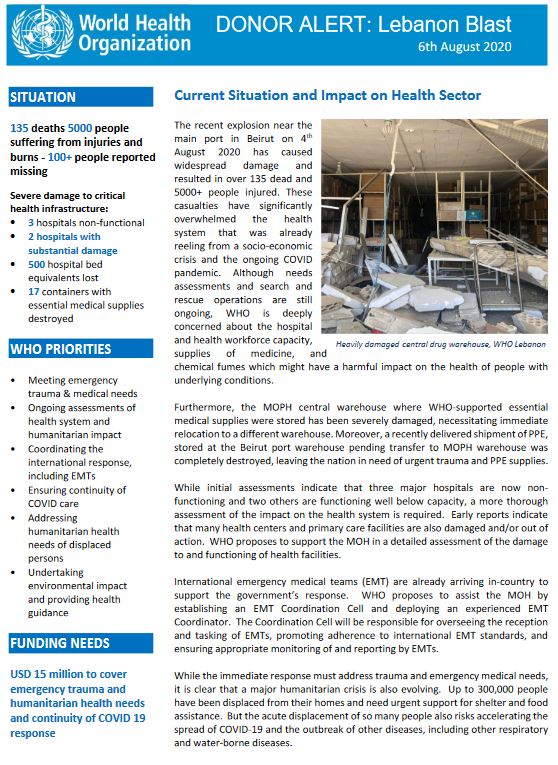Cairo/Beirut, August 6, 2020 – As the public health impact of the Beirut blast becomes clearer, WHO is calling for US$ 15 million to cover immediate emergency trauma and humanitarian health needs and ensure the continuity of the response to COVID-19 across the country.
“We are particularly concerned about overburdened hospital and health workforce capacity, shortages of medicines and medical supplies, and the public health impact of the chemical fumes, especially on people with underlying health conditions,” said Dr Iman Shankiti, WHO Representative to Lebanon. ” The acute displacement of many people also risks accelerating the spread of COVID-19 and the outbreak of other diseases, including other respiratory and waterborne diseases,” she added.
More than 5000 people were injured as a result of the blast, over 130 admitted to intensive care units, and up to 300 000 people have been displaced from their homes and need urgent support for shelter and food assistance.
Five hospitals in the area are either non-functional or partially functional, requiring injured patients to be transferred to health facilities across the country. Early reports indicate that many health centres and primary health care facilities are also damaged and/or out of action.
WHO is responding to the health needs from this blast by meeting urgent trauma and emergency medical needs through the provision of medicines and supplies and has already delivered trauma and surgical supplies to meet the needs of a total of 2000 patients. Further supplies and equipment are urgently required, including for hospital emergency departments and intensive care units.
WHO officials are also working with national health authorities to fully assess the public health impact of the blast, and identify gaps and immediate lifesaving needs, including conducting a comprehensive health facility damage and needs assessment in the affected area and the access to health services of displaced persons.
COVID-19 remains a concern. Due to the blast, 17 containers of WHO essential medical supplies were destroyed, with personal protective equipment (PPE) items completely burnt. Health care workers treating COVID-19 patients lack PPE, and hospitals receiving injured patients are overwhelmed and in need of urgent medical supplies. As the number of COVID-19 cases in Lebanon was increasing prior to the blast. WHO is also focusing its efforts on ensuring that all pillars of the response remain active and that there is a reliable supply of PPE and other supplies to replace the lost and damaged materials.
Together with the American University of Beirut, WHO will also conduct an environmental assessment on the impact of the fumes caused by the blast and has developed guidance for people on how to protect themselves from potentially harmful smoke and polluted air. The Organization continues to coordinate the delivery of essential health services, the strengthening of disease surveillance, and collaboration with other sectors to ensure disease control measures are in place.
Related links
 Donor alert: Lebanon blast
Donor alert: Lebanon blast
Lebanon blast situation reports
For more information: please contact:
Hala Habib
WHO Lebanon








